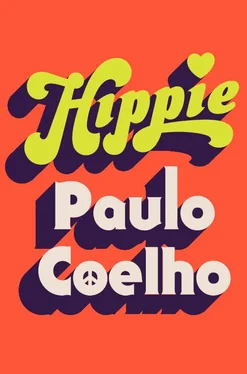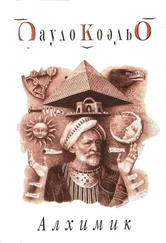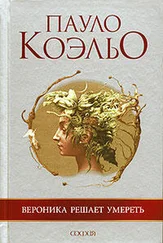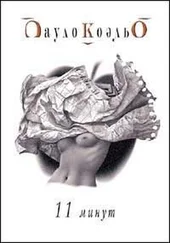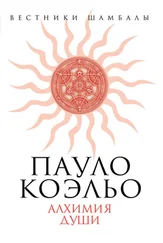The driver drew closer. The hippie who looked like Rasputin must have spoken French, because he sat on the floor to listen. The coffee arrived. This gave the journalist the energy to continue her lesson. Suddenly the general air of hostility had disappeared, and she was the center of attention.
“The idea spread during Christianity, when monks would walk into the desert in search of the necessary peace to speak with God. And it is with us until today, through well-known philosophers like the American Thoreau or the liberator of India—Gandhi. Keep it simple, they all say. Keep it simple and you shall be happy.”
“But how did this suddenly become a sort of trend, a way of dressing, of being a cynic in the current meaning of the word—not believing in Left or Right, for example?”
“That I couldn’t tell you. Some say it happened with the giant rock concerts, like Woodstock. Others say it was certain musicians, like Jerry Garcia and the Grateful Dead, or Frank Zappa and the Mothers of Invention, who began to give free shows in San Francisco. That’s why I’m here asking the two of you.”
She looked at her watch and rose to her feet.
“I’m sorry, I have to go. I have two more interviews today.”
She grabbed her papers, adjusted her clothes.
“I’ll show you to the door,” Jacques said. Any hostility had disappeared entirely—she was simply someone looking to do her job well and not an enemy who had come there to bad-mouth those she was interviewing.
“No need. There’s also no need to feel bad for what your daughter said.”
“I’ll accompany you all the same.”
They left together. Jacques asked her where he could find the spice bazaar—he had no interest in seeing things he wasn’t about to buy, but he was dying to breathe in the aroma of plants and herbs whose scents he might never have another chance to experience.
The journalist pointed the way and set off, her footsteps quick, in the opposite direction.
As he walked to the spice bazaar, Jacques—who had worked for so many years selling things that no one needed, forced to create a new campaign every six months to excite consumers about the “new product” that had just been launched—thought to himself that Istanbul ought to have a more effective tourism department: he was absolutely fascinated by its narrow streets, the tiny shops he passed, the cafés frozen in time—their decor, people’s clothes, the mustaches. Why did the vast majority of Turkish men grow a mustache?
He found the answer entirely by chance after stopping off in a bar that must have seen better days, its decoration entirely art nouveau, the kind you find only in the most hidden and sophisticated spots in Paris. He decided then to have his second Turkish coffee of the day—grains and water, no filter, served in a sort of copper cup with a stem on the side instead of a handle, something that he’d only seen there. He hoped that by the end of the day the stimulating effects would have left his body and he would be able to get another night of rest. The place wasn’t very full—actually, there was only one other client—and the owner, seeing that he was a foreigner, struck up a conversation.
The owner asked about France, England, Spain; he told the story of his Café de la Paix, he wanted to know what Jacques thought of Istanbul (“I just got here, but it seems to me more people ought to know about it”), the great mosques and the Grand Bazaar (“I still haven’t seen any of that, I got here yesterday”), and then he began to talk about the excellent coffee he served, until Jacques interrupted him.
“I noticed something interesting, and I might be wrong. But, at least in this part of the city, everyone has a mustache—including you, sir. Is this some tradition? You don’t have to answer if you don’t want.”
The bar owner seemed thrilled to answer.
“I’m so glad you noticed—I think that’s the first time a foreigner has come in here and asked me this. And listen, on account of my excellent coffee, the few tourists who do visit come here quite often, on the recommendation of the nicer hotels.”
Without asking permission, the owner sat down at Jacques’s table and asked his helper—a kid who’d barely made it past puberty, his face beardless—to bring him a mint tea.
Coffee and mint tea. That was all people seemed to drink in this country.
“Religious, then?”
“Me?”
“No, the mustache.”
“Not at all! It has to do with the fact that we’re men—with honor and dignity. I learned this from my father, who had a very finely manicured mustache, and who always said to me, ‘One day you’ll have one just like this.’ He taught me that, during my great-grandfather’s generation, when the damn English and—forgive me—French began to drive us to the sea, people had to decide on a direction forward. And, as each battalion was a nest of spies, they decided that a mustache would act as a sort of code. Depending on the way it was trimmed, it meant a person was either in favor of or against the reforms that the damn English—and, forgive me again, French—were seeking to impose. It wasn’t exactly a secret code, of course, but a declaration of principles.
“We’ve been doing this since the end of the glorious Ottoman Empire, when people were forced to determine a new path for the country. Those who were in favor of the reform wore a mustache in the shape of an M. Those who were against it allowed the sides of the mustache to grow downward, forming a sort of upside down U.”
And those who were neither for nor against?
“They shaved their entire faces. But it was shameful for those men’s families—as though they were women.”
“And that’s still true today?”
“The father of all the Turks—Kemal Atatürk, the army officer who finally managed to bring to an end the era of thieves put on the throne by the European powers, sometimes wore a mustache and sometimes not. This confused everyone. But once traditions are established, it’s difficult to forget them. Not to mention, coming back to the beginning of our conversation, what harm does it do for a person to demonstrate his masculinity? Animals do the same thing with their fur or feathers.”
Atatürk. The courageous army officer who’d fought in the First World War, staved off an invasion, abolished the sultanate, put an end to the Ottoman Empire, separated Islam from the state (which many had judged impossible). And, what was more important to the damn English and French, he refused to sign a humiliating peace treaty with the Allies—as Germany had done. A treaty that unintentionally planted the seeds of Nazism.
Jacques had already seen several photos of the greatest icon of modern Turkey—when the company where he’d worked had tried to conquer that empire once again, employing seduction and malice. He had never noticed that at times Atatürk appeared without a mustache; he’d noticed only that in the photos where he had a mustache he wore it in neither the shape of an M nor the shape of a U but in the Western tradition, in which the whiskers come to the ends of the lips.
My goodness, he’d learned so much about mustaches and their secret messages! He asked how much he owed for the coffee, but the bar owner refused payment: he’d charge him the next time.
“Many Arab sheikhs come here for mustache implants,” the man concluded. “We’re the best in the world.”
—
Jacques traded a few more words with the owner, who soon excused himself because his lunch clients were beginning to arrive. Jacques handed money to the beardless kid for the coffee and left, silently thanking his daughter for having literally pushed him to leave his job, with an excellent severance package. What if he were to return from his “vacation” and tell his work friends about mustaches and the Turks? They’d all find it interesting, exotic, but nothing more.
Читать дальше
